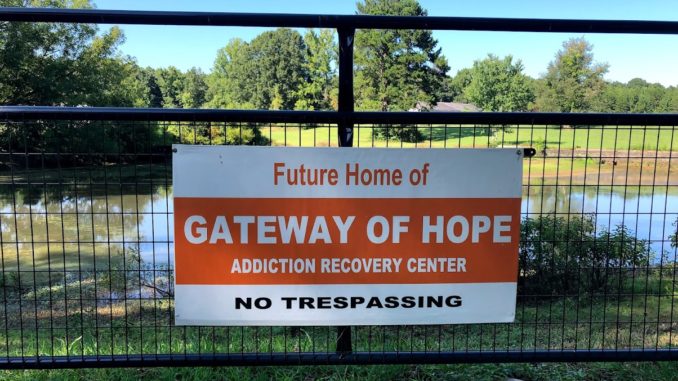
NEW LONDON — If all goes according to plan, the upcoming state budget produced by the North Carolina General Assembly will provide $1 million to build Stanly County’s first long-term addiction rehabilitation facility.
SCJ recently talked with Pastor Larry Wilkins — founder of the Gateway of Hope Addiction Recovery Center — and House District 67’s Rep. Wayne Sasser (R-Stanly) to discuss the plans, origins and motivations behind Wilkins’ goal to build a rehab center on a 26-acre property in New London.
Four years ago, Wilkins decided to transition his form of ministry from a traditional church setting into a home-based format, while also becoming a certified substance abuse counselor. Along the way, he gained two years of counseling experience at the Bridge to Recovery clinical addiction resource center in Monroe.
With Stanly County consistently ranking as one of the state’s highest-rated areas of opioid overdoses, a persistent and unresolved issue presented itself with few routes of change for the victims caught up in the cycle.
Wilkins recognized this local pattern, so he developed the Gateway of Hope non-profit group and created the Legacy Sober House program, which has culminated in three sober houses in downtown Locust with one new house in the works. Although the number of overall occupants is down to six people right now, each home contains five beds.
During this period of setting up the halfway houses in Locust, Wilkins’ long-term vision has been to build a facility in New London where individuals searching for recovery assistance can live for eight to 12 months while improving their lives mentally, physically and spiritually.
“Programs that last 28 days can serve a purpose, but for the impact that we want to have, we’re looking for a lasting commitment from our end to help them,” Wilkins said. “Another aspect of what we want to do out here is a jail-diversion program working with the courts — instead of a judge sending you to jail for the fifth time in two years, you could have the option of going to rehab for your sentence.”
Wilkins mentioned that a rehab facility in Stanly County would not only benefit the individuals searching for an escape from drug and alcohol abuse but would also be a relief on the county’s legal system that “sees a revolving door” of the same people being charged with the same drug-related crimes repeatedly.
If Gateway of Hope receives the funding it needs to formulate the environment that has been envisioned, a lodge-style building overlooking a four-acre pond on Fish Camp Road will be built “hopefully within a year,” Wilkins estimates.
The history of the area includes a former campground as well as Pat and Mick’s Fish House, a seafood restaurant that closed its doors in 2014.
The good news for Wilkins is that the proposed $1 million in assistance for the project is in the state budget proposed by the NC House of Representatives; the bad news is that the state’s House and Senate have yet to come to an agreement on a two-year budget that is now two months overdue.
“The state of North Carolina has $14 billion dollars in a checking account. Why do we need that much money that we can’t spend to help our citizens? Either spend it or give it back to them, and I’m willing to do some of both,” Rep. Sasser told SCJ.
While the money for Gateway of Hope exists on the House budget and not the Senate budget, Sasser is optimistic that the large bulk of funding for local projects will likely carry on in the final budget that passes through Raleigh. He explained that the primary hangup with the political compromise as it stands now involves the Senate wanting tax breaks and the House wanting to give state employees raises.
“We need some treatment facilities in Stanly County, because there are problems here that we will continue to have until we start addressing them,” Sasser said. “Hopefully we do a better job with the opioid settlement money than we did with the tobacco settlement money because we need it to get people off drugs and hopefully save lives. The opioid crisis doesn’t differentiate between economic status, community status, what sex you are or what color you are — it’s an equal opportunity offender.”
Sasser has stayed in touch with Wilkins and his plans for Gateway of Hope, with both sharing confidence that the quiet, serene property in New London would be an ideal spot to launch an extended-stay rehab facility to get personalized, dedicated help for those stuck in a cycle of narcotic abuse.
“People need to go somewhere where they can reconnect with their soul,” Sasser said, reflecting on the land where Gateway of Hope could be built upon. “It’s God’s country out there, and that’s a beautiful place to do it.”
